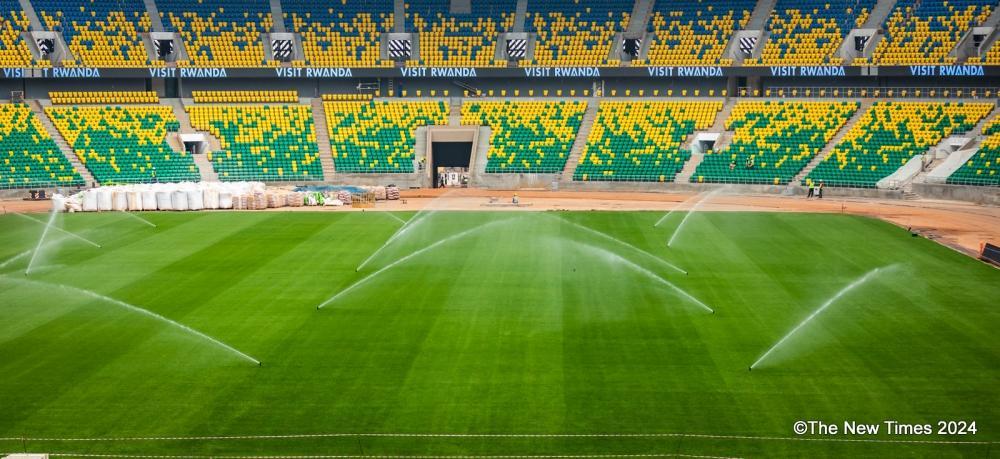Shyaka Kanuma
Africa-Press – Rwanda. Images of the soon-to-be-completed Amahoro Stadium in Remera have, like so many of the structures that go up in Rwanda, sent tongues wagging not only in the country but across the region and beyond.
Amahoro is a world class facility (comparable to the stadia in Qatar that hosted the last football World Cup). To even those used to these kinds of projects cropping up here, the sight of the magnificent stadium for the umpteenth time prompts the question: how does Rwanda do it?
The “ooohs!” and “aaahs!” of wonder, expressed on social media platforms are the same as those that greeted images of the adjacent Kigali (now BK) Arena, upon completion a few years back. They are the same exclamations of awe when the dome of the Kigali Convention Center was completed, about eight years ago.
Seemingly everywhere one looks in this country are great public infrastructural works that would be the envy of most developed nations.
How does Rwanda do it?
The first-time visitor – whose impressions of Rwanda probably have been shaped by the savage bloodshed of 1994 – will be deeply impressed as they go through Kigali International, an ultra-modern airport with efficient, smiling customs operations, when they were expecting far more crummier circumstances.
That visitor will look at the many RwandAir planes on the tarmac and think: how has a post-genocide country, which by all rights should be a basket case, built this first-rate carrier?
He or she will then breeze into town on first rate roads that are a far cry from the potholed, poorly maintained, badly gridlocked highways or streets that are the bane of many a city in developing countries.
Our first-time visitor probably will be listening to news bulletins, on the radio inside his taxi, and may learn of facts such as how Rwandan security forces have restored peace in this, or that country, and how in fact they are the most effective at peace-keeping missions. And on and on.
Now, I am not here to brag about what Rwanda has achieved (though I certainly would be justified!).
I only want to share a few of our secrets with those that wonder “how Rwanda does it” – especially where bigger, better endowed (in terms of natural wealth) countries fall short; countries which moreover never suffered anything like the appalling events which have roiled Rwanda.
The most frequent answer to the question is that the country has good, visionary leadership and all the advantages this bestows. That goes without saying.
Rwanda indeed has been extraordinarily lucky (well, after all the horrible things the country has endured, maybe we were long overdue some good luck) in having someone with the qualities of Kagame at the helm of the ship of state.
Yet good, even great leadership, by itself would never get a country very far absent certain other (enabling) factors.
Good leadership is only part of the equation, albeit the most important one, that a society has to get right before it succeeds, and acquires the ability to achieve big things.
Think of this: a president can be a good, principled man or woman of integrity that’s determined to do right by the society they lead. But if that society is riven by divisions, with different centers of power jostling in bad faith, and in tribal or sectarian ways to advantage their particular small group over the whole, the very best leader won’t get much done.
He or she will spend far too much of their energy or time doing damage control, rather than devote it to developmental efforts. They will be hamstrung by legislative bodies full of intrigue; of plotting to stymie even the best initiatives; and of individuals pursuing personal agendas, actively becoming a stumbling block to development.
In an environment like this, the many hallmarks of good leadership, say holding abusers of public office to account, will be dead on arrival. The worst governance practices will rise to the fore. And despair will reign in the wider public.
But Rwandans, shocked by the ruin that past tribal and sectarian politics visited upon their country, have resoundingly rejected the type of politics that sow division, or that pit one Rwandan against another. They have chosen to reconcile, and become one.
The leadership, post-Genocide, sold the society an ideal of Rwanda as one family with one destiny as the only way to move forward. Those efforts have borne fruit.
The people have bought into that ideal, and even the very few that, for opportunistic reasons, are fighting these processes know this is the right way. Even competing political parties have subsumed individual interests into those of the wider whole.
Yet building this oneness isn’t enough in itself.
Trust has had to be built, between government, its institutions, and the people – something that the ruling party in Rwanda has achieved, through actions of demonstrable integrity (we see where our taxes go for example, in building good roads, schools, and hospitals. Very little is stolen!)
Also, those that mismanage our affairs are held accountable, regardless who they are.
Thus, in Rwanda has arisen a situation whereby, say, when an individual in a position of power is arrested for abuse of power, every Rwandan citizen will approve. No one will be crying: oh they are arresting ‘our man’ because he is not from their tribe!
If the authorities jail an official on accusations of embezzling funds meant for building this or that stadium, no one will try to discredit the law enforcement agencies with claims like: oh, but this or that big person stole similar money, how come they weren’t detained!
Everyone is certain, and happy, that the law is applied equitably.
In this environment of trust of the government, and the circumstances that have helped earn it that trust, a leadership such as Kagame’s, which dreams big, is then able to do fantastic things.
It is a leadership that not only has earned my trust, but also my vote, and without a doubt that of millions of other Rwandans.
Source: The New Times
For More News And Analysis About Rwanda Follow Africa-Press






